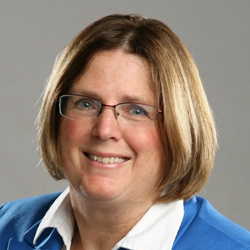Pediatric Infectious Disease Research Group’s COVID-19 Research
The Seattle Children’s Pediatric Infectious Disease Research Group, directed by Dr. Janet Englund, continues to study SARS-CoV-2, the virus causing the disease known as COVID-19. Dr. Englund is co-investigator for the CASCADIA study, which will assess how well COVID-19 vaccines protect participants against infection in the community. The study is being conducted by the University of Washington School of Medicine and Seattle Children’s Hospital in Seattle and the Kaiser Permanente Center for Health Research in Portland, Ore., and is funded by the U.S. Centers for Disease Control and Prevention.
Watch: Talk to your children about what to expect when they get the vaccine
COVID-19 Research Studies and Vaccine Clinical Trials
Dr. Englund’s research team may be reached at IDResearch@seattlechildrens.org.
The CASCADIA study will help us learn more about how often COVID-19 occurs among adults and children in a household. The study will also help us learn how well COVID-19 vaccines work to prevent COVID-19 infections and illness. Swab results for COVID-19, flu and RSV are now available to share with participants.
- If interested, you can learn more and contact the study team here
- View the CASCADIA study flyer here
The Pfizer Bivalent COVID-19 Booster study will look at how the vaccine booster aims to protect against the original COVID-19 strain in addition to the Omicron variant. Researchers at Seattle Children’s are conducting a bivalent COVID-19 vaccine research study for children under the age of five.
- If interested, contact the study team and share information here. View this flyer to learn more about the study.
The COVID-19 serology study looks at how vaccines work by helping your body create antibodies. We are working with the CDC to learn more about these antibodies including what kind are produced and how long they last. Your antibody results will be shared with you.
- If you are interested in learning more about this study and are willing to come in for blood draws, please email us at IDResearch@seattlechildrens.org with "serology study" in the subject line.
Investigating the Virus That Causes COVID-19
Research led by Dr. Englund on the COVID-19 immune response among children shows that children can make good antibody responses to the SARS-CoV-2 virus following infection. More than 100 children have enrolled in the study to date. Dr. Englund’s group also has found that about 3% of children receiving care at Seattle Children’s Hospital for non-COVID related issues have previously been infected with the virus that causes COVID-19.
Dr. Englund's team is leading research to better understand the virus that causes COVID-19:
- Children infected with SARS-CoV-2 can make antibodies that can neutralize the virus and are likely to have a protective effect against COVID-19.
- Home testing to detect respiratory viruses in early 2020 led to the first documented U.S. case of community transmission of SARS-CoV-2 at the time.
- Home-based surveillance using online participant enrollment and specimen self-collection is a safe and feasible method for community-level monitoring of influenza and other respiratory pathogens, which can readily be adapted for use during pandemics.
- What happened to influenza during the pandemic?
- Partnership with Seattle Public Schools supplement a report on school-based interventions to increase vaccination coverage amongst school-aged children.
Investigator Biographies
 Dr. Janet Englund is a professor of infectious diseases in the Department of Pediatrics at the University of Washington School of Medicine and a principal investigator at the Center for Clinical and Translational Research at Seattle Children’s. Her research interests include the study of vaccine-preventable diseases and viral respiratory diseases in young children and immunocompromised hosts, including transplant recipients. She studies new viral vaccines and novel methods of antiviral therapy for respiratory viruses including influenza, adenovirus, parainfluenza viruses, respiratory syncytial virus (RSV) and SARS-CoV-2, the virus that causes COVID-19.
Dr. Janet Englund is a professor of infectious diseases in the Department of Pediatrics at the University of Washington School of Medicine and a principal investigator at the Center for Clinical and Translational Research at Seattle Children’s. Her research interests include the study of vaccine-preventable diseases and viral respiratory diseases in young children and immunocompromised hosts, including transplant recipients. She studies new viral vaccines and novel methods of antiviral therapy for respiratory viruses including influenza, adenovirus, parainfluenza viruses, respiratory syncytial virus (RSV) and SARS-CoV-2, the virus that causes COVID-19.
As a leader in the field of infectious diseases, respiratory viruses, and infections in children, Dr. Englund is interested in assessing the epidemiology of the study of viral infections and assessing vaccine effectiveness. Dr. Englund is part of the New Vaccine Surveillance Network of the Centers for Disease Control and Prevention, participating in respiratory and gastrointestinal viral surveillance in collaboration with Dr. Eileen Klein to direct protocol development and patient enrollment to assess viral epidemiology and vaccine effectiveness for acute respiratory and gastrointestinal disease. Dr. Englund’s research group also is actively involved in the follow-up of pregnant women and a longitudinal study of children infected with SARS-CoV-2.
Over the past 30 years, Dr. Englund has had extensive experience in initiating, managing, and analyzing clinical trials, vaccine studies, and national and international research protocols, in addition to a track record for successful collaborative research. She has held leadership roles in multicenter, federally sponsored networks and research trial units, including the NIH-sponsored AIDS Clinical Trials Unit, the Vaccine Treatment and Evaluation Unit, and New Vaccine Surveillance Network. Her interest in protecting patients from viral diseases has contributed to national and international policies regarding pediatric immunization with rotavirus and papillomavirus vaccines, and maternal immunization with respiratory syncytial virus, influenza and pertussis vaccines. She is enthusiastic about work to further understanding of important respiratory and enteric viral infections and to contribute to controlling the spread of SARS-CoV-2.
 Dr. Alpana Waghmare is a pediatrician who specializes in the treatment and prevention of infectious diseases with a focus on respiratory infections and their impact on vulnerable populations. Her work is on viral infections in immunocompromised patients, and she studies both viral and host factors that might serve as disease severity biomarkers to help clinicians assess risk for their patients, develop prevention and treatment strategies, and carry out clinical trials for development of better drugs and vaccine. She is working on numerous COVID-19 projects, such as studying infections in cancer patients who have received transplants or CAR T-cell therapy, and she is working to understand immune responses of children after exposure to the virus.
Dr. Alpana Waghmare is a pediatrician who specializes in the treatment and prevention of infectious diseases with a focus on respiratory infections and their impact on vulnerable populations. Her work is on viral infections in immunocompromised patients, and she studies both viral and host factors that might serve as disease severity biomarkers to help clinicians assess risk for their patients, develop prevention and treatment strategies, and carry out clinical trials for development of better drugs and vaccine. She is working on numerous COVID-19 projects, such as studying infections in cancer patients who have received transplants or CAR T-cell therapy, and she is working to understand immune responses of children after exposure to the virus.
Participate in Research
You can help us answer questions about childhood health and illness and help other children in the future. Learn more about clinical trials and research studies at Seattle Children’s.